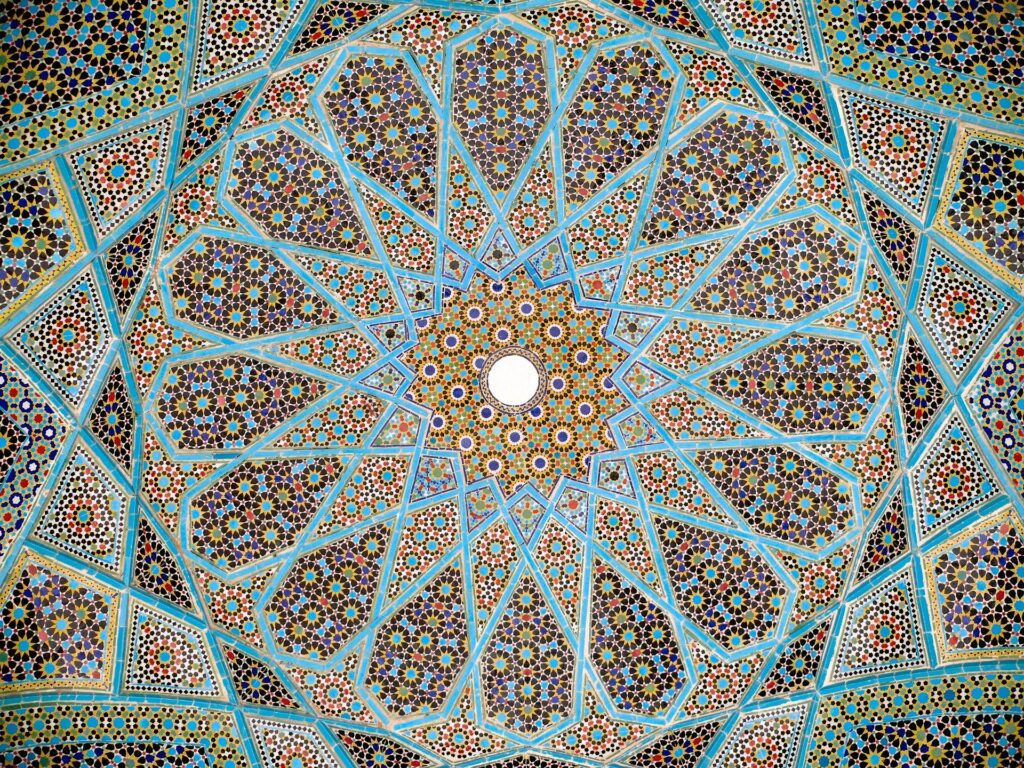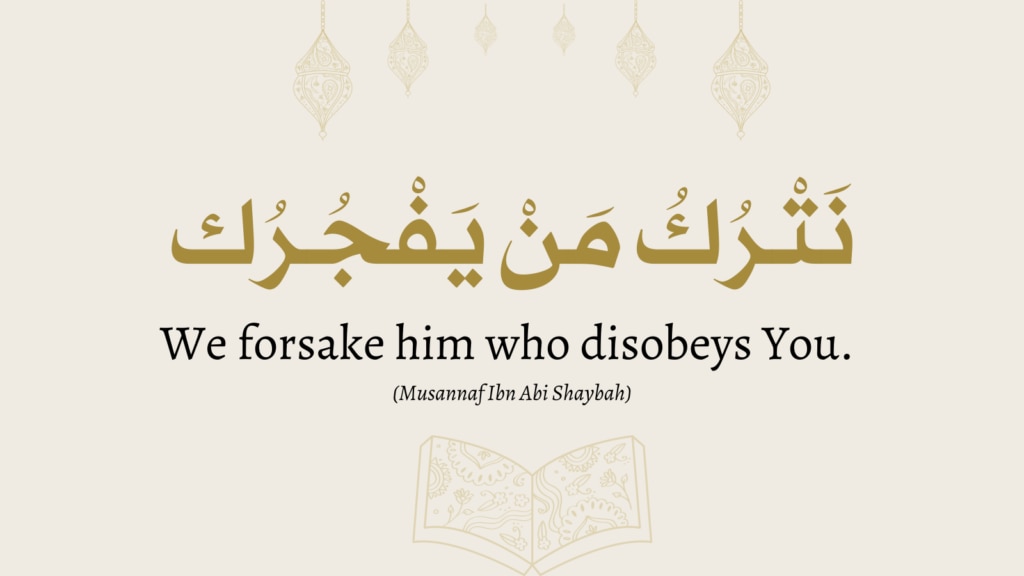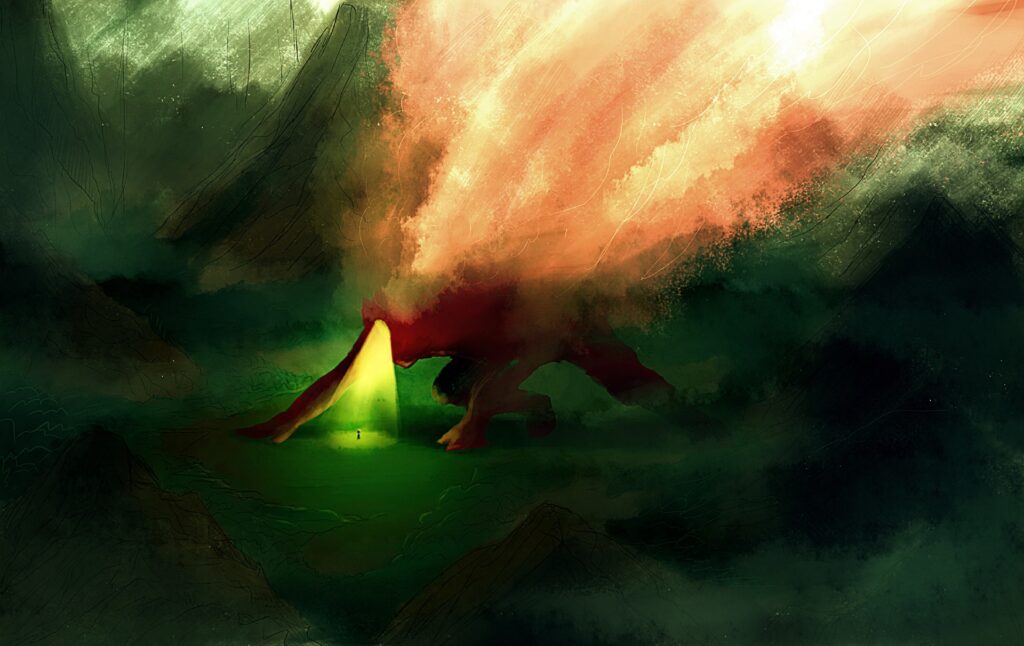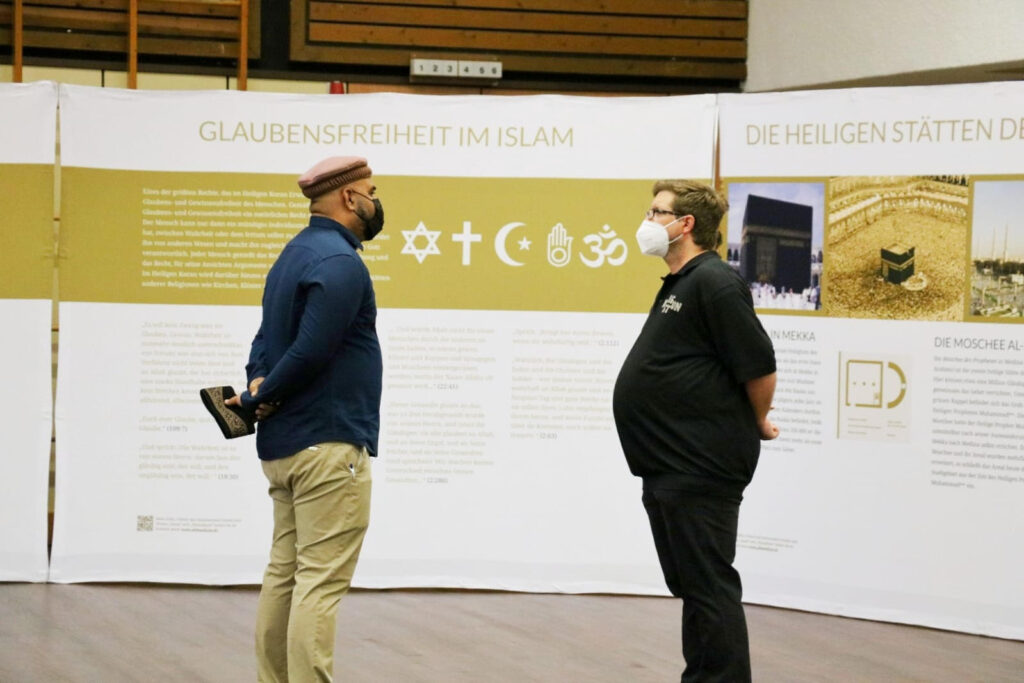Guidance regarding basic Islamic issues – which Hazrat Amirul Momineen, Khalifatul Masih Vaa has given on various occasions in his written correspondence and during MTA programmes – is being officially published below for everyone’s benefit
Zaheer Ahmad Khan, Head of Records Department, Private Secretariat, London

Did the Holy Prophetsa punish the woman who tried to poison him?
Hazrat Amirul Mumineen, Khalifatul Masih Vaa was sent a letter in which it said that Huzooraa had said in a Friday Sermon about the woman who tried to poison the Holy Prophetsa that she was forgiven by the Holy Prophetsa, while a hadith stated that the Holy Prophetsa had her killed. Further guidance was requested on this issue.
In a letter dated 20 February 2020, Huzooraa further elucidated the matter and gave the following reply:
“There has been a difference of opinion among the scholars of hadith regarding this issue. However, according to the more authentic and trustworthy books of hadith, this very view is correct that the Holy Prophetsa forgave her despite her clearly plotting to assassinate him and in spite of the fact that he felt the sting of the poison in his throat till the end of his life, he did not punish the woman out of personal revenge. Contrary to this, in ancient times, as well as in today’s advanced age and generally in the world, the death penalty is given for the mere plotting to assassinate a king or head of state.
“Some muhaddithin [the scholars of hadith] have stated that the reason for this difference of opinion is that initially, the Holy Prophetsa did not punish the woman in any way, but when Hazrat Bishrra bin al-Bara‘ died from eating the poisoned meat, he had the woman killed in accordance with the law of retribution [qisaas].
“Even if this explanation is correct, the aspect of the life of the Holy Prophetsa which has been conveyed by Hazrat Aishara, that he never took revenge on anyone for his own sake, very clearly comes to the fore through this incident.”

If humans are not born of their own will, why do they have to follow God’s laws?
Someone wrote to Hazrat Amirul Momineen, Khalifatul Masih Vaa that children often asked why they must obey God’s commands when they were not born of their own will.
Huzooraa, in a letter dated 4 February 2020, gave the following reply:
“Allah the Exalted gives life to a child upon the desire of the parents. He then admonishes the parents to pray to Him for their children to be pious and righteous. Allah the Exalted has also taught a prayer for this purpose in the Holy Quran.
“Allah the Exalted has declared humans the noblest of all the creations. He has endowed human beings with the ability to reason and has given them various faculties to be able to live their lives.
“He then set them free after granting them the ability to distinguish right from wrong and said, if they did good deeds in the temporary life of this world, they would inherit various rewards from Allah in the eternal life of the Hereafter. However, if they did evil deeds, they would fall into the hands of Satan, and because of this, on the one hand, they would be deprived of these rewards of all kinds, and on the other hand, they would have to go through all sorts of painful treatments in Hell – the hospital of the Hereafter to cure the spiritual ailments that they would suffer due to following in the footsteps of Satan.
“The same thing is mentioned in the dialogue between Allah the Exalted and Satan which the Holy Quran has narrated to us, that when Satan said to Allah the Exalted that he would lead mankind astray from His path, Allah replied that His servants would never listen to him, and He would reward His servants with rewards like Heaven, and those who disobeyed him, He would fill Hell with them.
“Thus, now it is the duty of every human being to think for themselves whether they are to inherit the rewards of Allah the Exalted by following His commands or to become entitled to the punishments of Hell by following the way of Satan.”
What does the phrase “We forsake him who disobeys You” [natruku man yafjuruk] from the Qunoot prayer mean?

The same person also asked whether the phrase, “We forsake him who disobeys You” [natruku man yafjuruk] from the Qunoot prayer also meant disobedient children and members of the Community.
Huzooraa, in the same letter, said:
“As far as this phrase from the Qunoot prayer is concerned, it refers to the wicked and evil disbelievers who killed Muslims by way of hypocrisy and deception and harmed them in various ways. Therefore, it was only after incidents like the ones that took place at Bir Maona and ar-Raji‘ that the Holy Prophetsa began performing the Qunoot.
“Therefore, children who are disobedient to their parents or members who have received some administrative punishment from the system of the Jamaat are not meant by that.
“However, those members of the Community who have been given some administrative punishment by the Jamaat but on whom these punishments seem to have no effect – those who have been seized by their false egos and they forget that they have to obey the system of the Jamaat – in order to make such people aware of the [gravity of the] punishment, it is the duty of the rest of the Community not to sit with them in gatherings, not to invite them to their events and not to include them in their celebrations. This is so because the Jamaat’s punishment is given in order to exert social pressure.
“However, the wife, children and parents are given permission to have a relationship with them in order to admonish them and to try to make them obedient and productive members of the Jamaat.”
Can we judge based on a deceased person’s deeds in this world that they will be in Paradise or Hell?
Hazrat Khalifatul Masih Vaa was asked whether one could judge, based on a deceased person’s deeds in this world, that they would be in Paradise or Hell.
In a letter dated 4 February 2020, Huzooraa gave the following reply:
“Allah the Exalted sends prophets to call people to righteousness so that they may inherit the eternal rewards of the Hereafter by living the temporary life in this world according to His commands and so that they may abandon the evil ways and avoid the punishment of the Hereafter. Therefore, it is obligatory to believe in Allah and His prophets. The Holy Quran has elucidated this subject in various places.
“Nevertheless, the decision to send someone to Heaven or Hell is with Allah the Exalted because He is the Master of everything and He says that He forgives all sins except shirk [associating partners with God]. Therefore, no ordinary person has the authority to issue a fatwa for others on whether they would go to Heaven or Hell.
“However, since God’s prophets and messengers receive knowledge of the unseen from God, when they make a statement about someone, it is in fact based on the knowledge from God Almighty and the absolute truth.
“Hence, it is mentioned in a hadith that a funeral procession passed by the Holy Prophetsa. People praised the deceased. The Holy Prophetsa said that Paradise had become obligatory for him. Then another funeral procession passed by and the people criticised the deceased. The Holy Prophetsa said that Hell had become obligatory for him. He further said that the believers were witnesses of Allah on earth. [Sunan al-Nisai, Kitab al-Janaiz, Bab al-Thanaa]
“Moreover, it should be remembered that Allah the Exalted is Gracious and Merciful. He definitely rewards one for even the smallest good deed. Hence, it is narrated in the hadith that a companion said to the Holy Prophetsa that while in a state of disbelief [before converting to Islam], he had donated plenty of wealth to the poor just to please God Almighty. He asked if he would be rewarded for that. The Holy Prophetsa said that it was that charity that had drawn him to Islam. [Sahih Muslim, Kitab al-Iman, Bab bayani hukmi ‘amali li-kafiri idha aslama ba‘dah]
“Therefore, it is not up to every common man to declare, upon the demise of a person, whether the deceased would go to Heaven or Hell on the basis of that person’s religious beliefs. This is the job of God Almighty or that of His prophets and messengers on His behalf.”

Is Dajjal an individual’s name?
Someone wrote to Hazrat Khalifatul Masih Vaa and said that Huzooraa had described Dajjal as a metaphor instead of a physical person during one of his addresses at the Jalsa Salana Germany. However, they further said that they had come across a video in which a hadith from Sahih Muslim was mentioned, which described Dajjal as a physical human. Huzooraa was asked whether the hadith was authentic.
In a letter dated 20 February 2020, Huzooraa gave the following reply:
“As a matter of fact, among the afflictions and tribulations that Islam was to endure in the Latter Days, there is a special mention of Dajjal and Gog & Magog. Hence, we find that the Holy Quran mentions these tribulations from different angles and the Holy Prophetsa has also warned his ummah about these tribulations in different ways that are mentioned in many ahadith.
“One of them is a hadith of Sahih Muslim which you have mentioned. This hadith, like other ahadithrelated to this subject, is based on a vision [kashf] and metaphors. Had the narration of the events mentioned in this hadith been based on a physical occurrence, then numerous other people, besides the narrator [of the hadith], would have also seen ‘Jassasah’ [the beast] and the giant Dajjal mentioned in this hadith, with their naked eyes.
“Therefore, the statement of someone else in this hadith not to state his apparent observation about matters proves that it was a revelation. Therefore, the fact that none of the others narrated a physical observation of the events mentioned in the hadith, proves that it was a vision [kashf].
“As far as the reality of the Dajjal and Gog & Magog is concerned, they are different manifestations of the same tribulation [fitna]. Dajjal is the name of the religious aspect of this fitna. That means that this group was to corrupt people’s religious beliefs and ideas in the Latter Days.
“The group that was to destabilise the political situation and destroy the political peace and order in those days has been called Gog & Magog. Both refer to the worldly power of the Western Christian nations and their religious aspect.
“Nevertheless, alongside all this, Allah the Exalted has also informed us through His Beloved Prophetsa that when the tribulations of Dajjal and Gog & Magog would occur and Islam would become weak, Allah the Exalted would send the Promised Messiahas to safeguard Islam. At that time, Muslims would not have material power, but the Community of the Promised Messiahas would continue to work through prayers and preaching, thanks to which Allah the Exalted would Himself destroy these tribulations.”

What can Muslims do to dispel the fears of non-Muslims and reassure them regarding Islam?
During a virtual mulaqat of Majlis Atfal-ul-Ahmadiyya Germany with Hazrat Amirul Momineenaa, which was held on 29 November 2020, a tifl said to Huzooraa that due to the current circumstances, non-Muslims had a fear of Muslims. He asked as to how one should reassure them?
Huzooraa replied:
“We have always undertaken this effort and have endeavoured [to eradicate this fear] for the past many years. That is why I hold peace symposia and I also admonish you to hold peace symposia, distribute pamphlets promoting peace and explain the true teachings of Islam to the people. The true teachings of Islam are that of love and affection. When you will explain this to people, their fears will be removed. The greater our efforts will be, the more awareness we will be able to spread amongst the people and they will come to know about the true teachings of Islam. Therefore, we should endeavour to spread these teachings to as many people as possible, including our friends. You would have friends in school, who are students like yourself. Explain what the true teachings of Islam are to them.
“The true teachings of Islam are that of love and affection. Islam does not permit any kind of warfare or jihad. As a matter of fact, there are conditions in which Islam has permitted warfare or [so-called] jihad; rather, when the first commandment about jihad was revealed, Allah clearly mentioned in the Holy Quran that Muslims were permitted to undertake jihad because the people were inflicting cruelties upon the Muslims, and if the Muslims did not stop them from committing these cruelties, then churches, Jewish synagogues, temples and mosques would be destroyed.
“So, if Islam permitted jihad, then the sole purpose for this was so that religion could be secured and protected. Under no circumstances does Islam permit jihad [with the sword] or the killing of people in order to spread one’s religion.
“Islam says that if you see someone attacking a Christian church, it is the duty of a Muslim to go and help to save that Christian church. Islam says that if anyone attacks a Jewish synagogue, then you should go to help save that Jewish synagogue. Similarly, Islam instructs that if someone is attacking a Hindu temple, then you should go to help and protect it. One should also protect his own mosque in this way as well. Islam grants protection to everyone.
“Therefore, you ought to openly and clearly explain to people and your friends that this is what is written in the Holy Quran. Tell people that these jihadists or extremists who claim to be Muslims are actually spreading false ideologies and not the teachings of Islam. When you will explain these things to people, they will realise that Islam is a religion that establishes peace and love.”

Can one recite “inna lillahi wa inna ilayhi raji‘un” upon the demise of a non-Muslim?
During the same virtual mulaqat [of Majlis Atfal-ul-Ahmadiyya Germany with Hazrat Khalifatul Masih Vaa, a tifl asked, “When a Muslim passes away, we recite ‘Inna lillahi wa inna ilayhi raji‘un’. However, if a non-Muslim passes away, can we also recite this for them or not?”
Huzooraa replied:
“Naturally, if you feel for their loss and have had any kind of relation with them, you may recite this because we will all eventually return to Allah. Everyone is going to return to Allah but only Allah knows best how He will deal with them after that. It is possible that although a person was a non-Muslim, they may have pleased Allah by one of their good deeds and owing to that, Allah may create the means for their forgiveness or He may deal with them in whichever manner He deems appropriate.
“The reason that we recite ‘inna lillah’ is that if any kind of harm has occurred, then it is Allah the Exalted who can recompense and make matters good again. So, we say that we belong to Allah and turn towards Him alone in every difficulty and in every matter. If we have a friend or know a person that has been kind to us; if we recite this prayer upon their [demise], then it means that they have returned to Allah, and we too shall return to Allah; may Allah the Exalted compensate for any harm that was caused to us because of their loss and where possible, may He treat them with mercy on account of his good actions and words.
“In reality, the reason we recite ‘inna lillah’ is that we implore Allah to compensate us for our loss; He may free us from the grief or sorrow we feel for a departed one because we belong to Allah and turn towards Him in every matter, regardless of what kind of loss we may have suffered, such as loss of life, loss of wealth or loss of any other kind.
“This is not only recited when someone passes away; rather, if one incurs a loss in wealth, even then one would recite ‘inna lillah’. The reason for this is that we turn to Allah alone in all matters and we shall not depend upon anyone else. Therefore, there is no harm in reciting ‘inna lillah’ [at the demise of a non-Muslim]. A person whom you know, one who is close to you and helps you; if such a person passes away, then there is no harm in reciting ‘inna lillah’.
“Generally speaking, one should seek the mercy of Allah the Exalted for everyone except if one is an idolater. You should not pray for someone who is an idolater – who associates partners with Allah the Exalted. Aside from that, there is no harm in seeking the mercy of Allah the Exalted for those people who follow a particular religion.”
If God has already decreed our destiny, then what is the need for prayer?
During the same virtual mulaqat, a tifl asked, “When Allah the Exalted has decreed our destiny, then why do we pray and what is the need for prayer?”
Huzooraa replied:
“Certain types of destiny cannot be averted, and there are some which can be averted. So, that is why we supplicate.
“Take death for example. Everyone must die. It is a proven fact that all must die. No one can live forever. This is the decree of Allah the Exalted [that cannot be averted]. However, if a person falls ill and their condition reaches the state where doctors say that they are close to death, but we pray, and accepting our prayers, Allah the Exalted brings them back from the brink of death and grants them life, then this decree of Allah the Exalted is one that was averted through prayer. Nevertheless, even if that person goes on to live to an age of 70, 80 or 90, they will ultimately have to die.
“The Promised Messiahas has written:
گر سو برس رہا ہے، آخر كو پھر جدا ہے
“‘One may live to a hundred, but in the end, they must depart.’ Even if a person lives to a hundred years of age, he must die eventually.
“However, if, for example, one is close to dying whilst still in his youth and we pray for them, then Allah the Exalted may avert it, and as a result, grant them a long life.
“There are many such examples that people write to me and request prayers. I reply to them and by the grace of Allah, the prayers are accepted. People also write about their own accounts where they have supplicated and through that prayer, Allah the Exalted averted the misfortune which was to befall them.
“So everything is happening in accordance with the decree of Allah the Exalted, but if we do not pray or make an effort with regard to our destiny, then the natural result of that will come to light. The reason why we pray [on such occasions] is so that we may avert or delay the decree of God Almighty which has the possibility of being averted and thus bring about a better outcome.
“Allah the Exalted has placed two paths before us – one which is beneficial and one which is harmful. Now, if we obey Allah the Exalted, we shall avail of that which is beneficial and for this, we also make an effort and supplicate. However, if we do not listen to Allah the Exalted, nor make the right effort, nor pray, then the negative aspect of that decree will manifest itself.
“There are two types of destiny; one which can be averted, and the other which cannot be averted. The decrees which cannot be averted are the verdicts of Allah the Exalted which must come to pass. Allah the Exalted does not accept prayers with regard to these and they cannot be averted.
“As for the decrees which can be averted, Allah the Exalted can prevent them through one’s prayers and efforts. This is why Allah the Exalted has said that we should supplicate, which will enable us to form a bond with Him and our faith in Him will strengthen, and as a result, we will advance further in our faith and spirituality and we shall reap the benefits thereof.”

